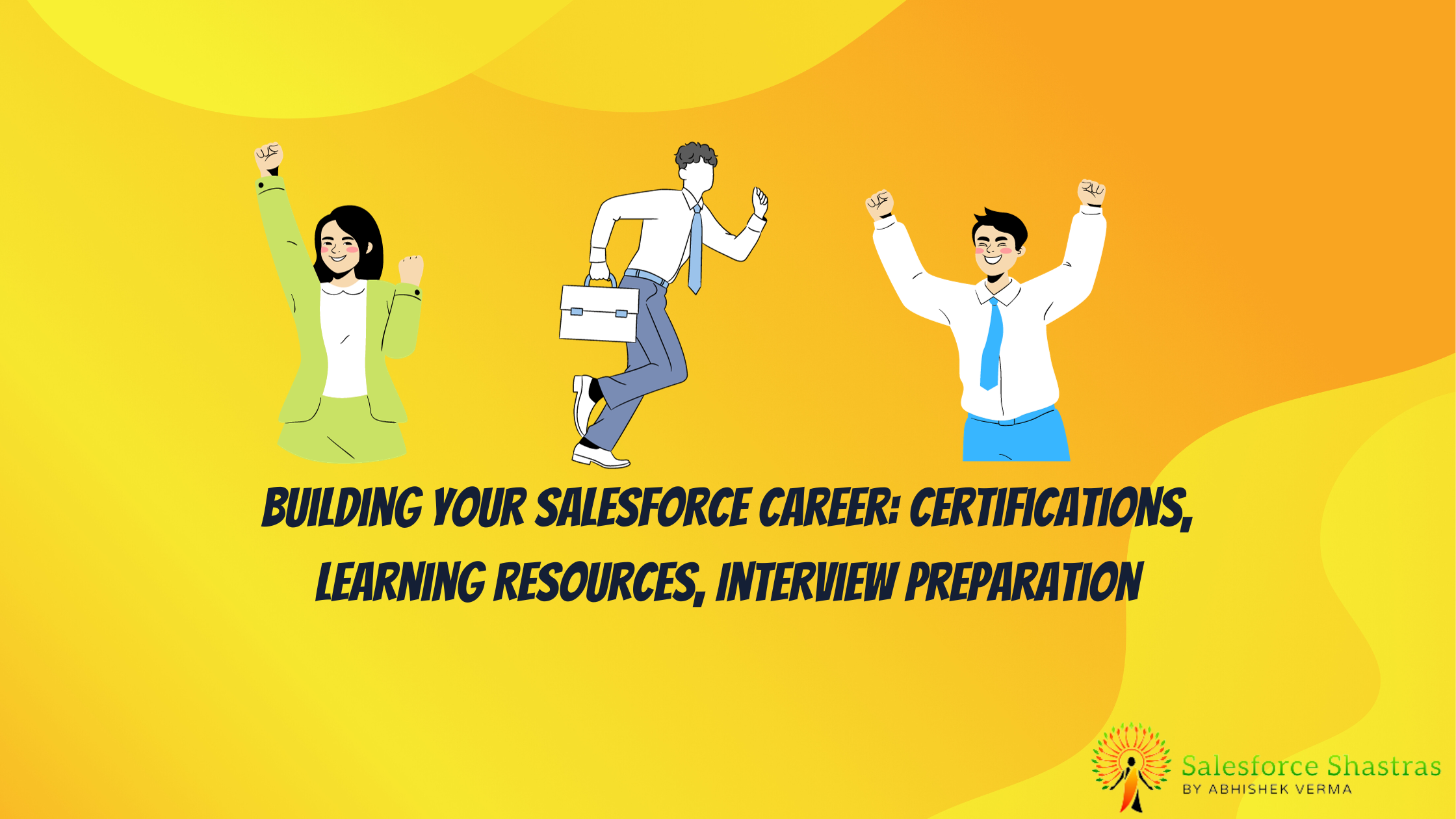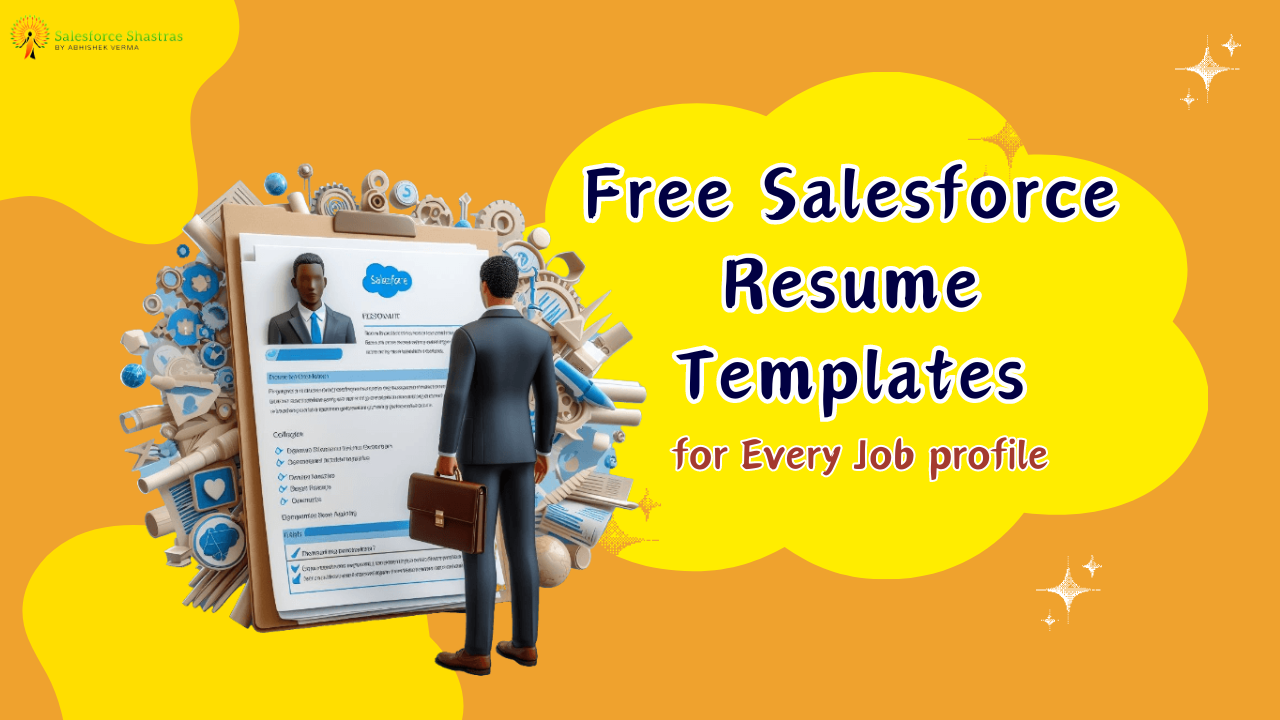How to Start Salesforce Career
Starting a career in Salesforce can be a rewarding and fulfilling journey. Whether you are a recent graduate or a professional looking to switch careers, Salesforce offers numerous opportunities for growth and success. Here are a few steps to kickstart your Salesforce career:
- Develop a Clear Goal: Before diving into the world of Salesforce, it’s essential to define your career goals. Determine which aspect of Salesforce appeals to you the most, such as administration, development, or consulting. This clarity will help you focus your efforts and make informed decisions.
- Acquire Salesforce Knowledge: In order to succeed in the Salesforce ecosystem, it is crucial to have a strong foundation in the platform. Start by familiarizing yourself with Salesforce basics, such as navigation, data management, and automation. Salesforce Trailhead, an interactive learning platform, is a valuable resource for beginners. It offers modules, projects, and trails to guide you through the learning process.
- Obtain Salesforce Certifications: Salesforce certifications are highly regarded in the industry and can significantly enhance your career prospects. Choose a certification path that aligns with your career goals, whether it’s becoming a Certified Administrator, Developer, or Consultant. Salesforce provides official study guides and practice exams to help you prepare for the certification exams.
- Gain Practical Experience: Theory is important, but gaining hands-on experience is equally crucial. Look for volunteer opportunities, internships, or part-time jobs that allow you to work on real Salesforce projects. Not only will this boost your practical skills, but it will also provide you with valuable experience to showcase on your resume.
How to Start Learning Salesforce
Learning Salesforce can seem overwhelming at first, but with the right approach and resources, it becomes an exciting journey of knowledge acquisition. Here are some steps to help you get started on your Salesforce learning journey:
- Define Your Learning Style: Understanding your preferred learning style can make the learning process more efficient and enjoyable. Are you a visual learner who benefits from videos and illustrations? Or do you prefer reading and studying textual resources? Determine your learning style and choose resources accordingly.
- Utilize Salesforce Trailhead: Salesforce Trailhead is an excellent platform for beginners, offering a wide range of modules and trails for various skill levels. It provides a gamified learning experience, making it engaging and interactive. Start with the basics and gradually progress to more advanced topics.
- Join Online Communities: Salesforce has a vibrant online community of developers, administrators, and enthusiasts. Joining these communities, such as the Salesforce Developer Forums or the Success Community, can provide valuable insights, tips, and support. Connect with professionals who share a passion for Salesforce, and learn from their experiences.
- Attend Training and Workshops: Many organizations and training institutes offer Salesforce training programs and workshops. Consider enrolling in these programs to receive expert guidance and hands-on training. These sessions often provide practical examples and case studies, which can accelerate your learning journey.
- Practice, Practice, Practice: The adage “practice makes perfect” holds true in the Salesforce world as well. Create your own Salesforce Developer Edition org and experiment with various configurations, customizations, and workflows. Building real projects and solving practical problems will reinforce your knowledge and build confidence.
What Are the Roles Available in Salesforce
Salesforce offers a diverse range of roles that cater to different skill sets and interests. Here are some common roles in the Salesforce ecosystem:
- Salesforce Administrator: Administrators are responsible for managing and configuring Salesforce instances according to the organization’s needs. They handle data management, user access, security settings, and customization of the platform.
- Salesforce Developer: Developers are skilled in programming languages like Apex, JavaScript and LWC they build custom solutions on the Salesforce platform. They create and customize applications, develop integrations, and write code to automate business processes.
- Salesforce Consultant: Consultants work closely with clients to understand their business requirements and provide solutions using Salesforce. They analyze existing processes, propose improvements, and oversee the implementation of Salesforce solutions.
- Salesforce Architect: Architects design and architect scalable and robust Salesforce solutions. They have in-depth knowledge of the Salesforce platform, integration patterns, and best practices. They collaborate with stakeholders, developers, and administrators to ensure successful implementation.
- Salesforce Sales/Account Executive: Sales and account executives focus on selling Salesforce products and solutions to potential clients. They identify business opportunities, build relationships, and work towards achieving sales targets.
Salary in India for Salesforce as per 2023
The demand for skilled Salesforce professionals in India has been steadily increasing, leading to attractive salary packages. As of 2023, the salary range for Salesforce professionals in India varies depending on factors such as experience, certifications, and job role.
Here is a rough estimate of salary ranges in India for popular Salesforce roles:
- Salesforce Administrator: Entry-level Salesforce administrators in India can expect a salary range of approximately INR 3-6 lakhs per annum. With experience and additional certifications, this can increase to INR 8-12 lakhs per annum.
- Salesforce Developer: Junior Salesforce developers typically earn around INR 5-8 lakhs per annum, while experienced developers with advanced certifications can earn up to INR 15-20 lakhs per annum.
- Salesforce Consultant: The salary range for Salesforce consultants in India starts at around INR 6-9 lakhs per annum for entry-level positions. Experienced consultants with a strong track record can earn anywhere between INR 12-18 lakhs per annum.
- Salesforce Architect: Salesforce architects are among the highest-paid professionals in the Salesforce ecosystem. They can earn anywhere between INR 18-30 lakhs per annum, depending on their level of expertise and experience.
It’s important to note that these figures are approximate and can vary based on various factors such as location, company size, and industry sector.
How to Get a Job in Salesforce
Getting a job in the Salesforce industry requires a combination of skills, certifications, and networking. Here are some steps to help you land a job in Salesforce:
- Become Salesforce Certified: Employers value Salesforce certifications as they validate your knowledge and expertise. Start by obtaining the fundamental certifications, such as Salesforce Administrator or Salesforce Platform App Builder. These certifications act as a strong foundation for your career.
- Build a Strong Salesforce Profile: Create a compelling and comprehensive Salesforce profile that highlights your skills, certifications, and relevant experience. Include any Salesforce projects you have worked on, volunteer work, or contributions to the Salesforce community.
- Network and Attend Events: Networking plays a crucial role in finding job opportunities. Connect with other professionals in the Salesforce community through online platforms, events, and user groups. Attend Salesforce events, such as Dreamforce, to meet industry experts and potential employers.
- Leverage Online Job Portals: Explore job portals and websites that specifically cater to Salesforce roles. Update your profile on these platforms and regularly search for relevant job openings. LinkedIn is also a valuable resource for finding Salesforce job opportunities.
- Apply for Internships and Volunteer Work: Consider applying for internships or volunteer positions that allow you to gain practical experience in Salesforce. These opportunities can help you build your resume and make valuable connections in the industry.
- Prepare for Interviews: Research commonly asked interview questions for Salesforce roles and prepare your responses in advance. Practice mock interviews to improve your interviewing skills and boost your confidence.
How to Get an Internship in Salesforce
Securing an internship in Salesforce can be a stepping stone towards your dream career. Here are some steps to help you get an internship in Salesforce:
- Learn the Basics: Start by gaining a strong understanding of the Salesforce platform. Familiarize yourself with the fundamentals of Salesforce administration and development. This knowledge will be valuable during your internship.
- Join the Salesforce Community: Get involved in the Salesforce community by joining online forums, attending webinars, and participating in Salesforce user groups. Engage with professionals and experts in the field to expand your network.
- Leverage University Networks: Check if your university has partnerships or affiliations with Salesforce or its ecosystem of companies. Many universities offer Salesforce internships or connect students with Salesforce employers. Reach out to your career services department for assistance.
- Apply to Salesforce Partner Companies: Salesforce partner companies often have internship programs that can provide valuable hands-on experience. Research these companies and submit applications to their internship opportunities.
- Utilize Salesforce Trailhead: Salesforce Trailhead offers specific trails and modules for students and beginners. Completing these tracks and earning badges will demonstrate your commitment to learning and enhance your internship application.
- Highlight Relevant Experience: Even if you don’t have direct Salesforce experience, highlight any transferrable skills or experiences that are relevant. For example, emphasize your proficiency in data analysis, problem-solving, or project management.
- Prepare a Strong Resume and Cover Letter: Tailor your resume to showcase your enthusiasm for Salesforce and highlight any related coursework, projects, or extracurricular activities. Write a customized cover letter that outlines your goals and why you are interested in interning with Salesforce.
- Virtual Internship Program: click here

How to Prepare for Salesforce Interview
Preparing for a Salesforce interview requires a combination of technical knowledge, problem-solving skills, and confidence. Here are some tips to help you prepare for your Salesforce interview:
- Review Salesforce Concepts: Refresh your understanding of fundamental Salesforce concepts such as data types, objects, relationships, and automation tools. Familiarize yourself with common Salesforce terminologies and functionalities.
- Practice Mock Interviews: Find a friend or mentor who is familiar with Salesforce and conduct mock interviews. Practice answering common Salesforce interview questions, such as “What is a workflow rule?” or “How do you handle data security in Salesforce?”
- Research the Company: Prior to your interview, research the company you are interviewing with. Understand their industry, products, and any recent news or updates related to Salesforce implementations or projects they have worked on.
- Be Prepared to Showcase Your Projects: If you have worked on any Salesforce projects or have relevant experience, be prepared to explain the specifics and highlight the impact you made. Share any challenges you encountered and how you overcame them.
- Demonstrate Problem Solving and Critical Thinking: Employers look for candidates who can think critically and find effective solutions. Be prepared to discuss real-life scenarios or hypothetical situations and how you would approach them.
- Stay Updated with Salesforce Trends: Salesforce is continually evolving, so it’s essential to stay updated with the latest features and releases. Familiarize yourself with recent Salesforce updates, such as the introduction of Lightning Experience or enhancements in Einstein Analytics.
- Ask Relevant Questions: At the end of the interview, don’t forget to ask thoughtful questions that demonstrate your interest and engagement. Inquire about the company’s future Salesforce initiatives or the team structure.
Where Can I Find Real-Time Salesforce Implementation Experience as a Beginner or Fresher
As a beginner or fresher in Salesforce, gaining real-time implementation experience can be a challenge. However, there are several ways you can acquire practical experience and enhance your skills:
- Volunteer for Salesforce Non-Profit Organizations: Many non-profit organizations rely on Salesforce to manage their operations. Volunteer your time and skills to help these organizations implement or enhance their Salesforce instances. This will not only allow you to gain hands-on experience but also contribute to a worthy cause.
- Join Salesforce Community Groups: Salesforce community groups, both online and offline, provide opportunities to collaborate on real-life Salesforce projects. Connect with other Salesforce enthusiasts, participate in group projects, and learn from experienced professionals.
- Participate in Hackathons and Competitions: Salesforce often organizes hackathons and competitions that allow participants to showcase their skills and creativity. These events provide a platform to work on real-life Salesforce problems and receive feedback from industry experts.
- Create Personal Salesforce Projects: Build your own Salesforce projects that simulate real-world scenarios. Identify a problem or process that can be automated or improved using Salesforce and develop a solution. This will demonstrate your initiative and dedication to potential employers.
- Apply for Entry-Level Salesforce Positions: While it can be challenging to find entry-level Salesforce positions that offer real-time implementation experience, keep an eye out for job openings that specifically target beginners. These positions may provide on-the-job training and mentorship to help you gain practical experience.
- Offer Salesforce Consulting Services: Leverage your knowledge and skills to offer Salesforce consulting services to small businesses or individuals. Help them with Salesforce setup, customization, and ongoing support. This will not only allow you to gain practical experience but also build your professional network.
Mock Interview Questions
Preparing for a Salesforce interview can be daunting, but practicing mock interview questions can help you gain confidence and polish your responses. Here are a few mock interview questions to get you started:
- What is the difference between a role and a profile in Salesforce?
- Explain the differences between a custom object and a standard object.
- How would you handle sharing permissions for a custom object with different user groups?
- What is a validation rule in Salesforce and how would you use it?
- How do you create a report in Salesforce?
- What is an Apex trigger? Provide an example of when you would use a trigger.
- Explain the differences between Workflow Rules and Process Builder.
- How do you handle bulk data loads and updates in Salesforce?
- What are the different types of relationships between objects in Salesforce?
- Describe the use case for Visualforce pages and Lightning components.
Remember, these are just sample questions, and it’s important to research and prepare for a wide range of technical and scenario-based questions based on your desired role in Salesforce.
Conclusion
Embarking on a Salesforce career can be a rewarding and fulfilling journey for those with a passion for technology and sales. By following the outlined steps, you can lay a strong foundation, gain hands-on experience, build a professional network, and secure job opportunities in the Salesforce ecosystem.
FAQs (Frequently Asked Questions)
- Q: Can I start a Salesforce career without any prior experience in programming?
A: Yes, absolutely! Salesforce offers various roles and opportunities that don’t require extensive programming experience. However, willingness to learn and develop coding skills can be advantageous. - Q: How long does it take to become proficient in Salesforce?
A: The time required to become proficient in Salesforce varies depending on your dedication, prior experience, and the complexity of the skills you aim to acquire. It can range from a few months to several years. - Q: Are Salesforce certifications necessary to start a career?
A: While not mandatory, Salesforce certifications can significantly enhance your credentials and increase your chances of getting hired. They validate your knowledge and expertise in specific areas of Salesforce. - Q: Can I transition to a Salesforce career from a non-technical background?
A: Yes, you can transition to a Salesforce career from various backgrounds, including sales, marketing, customer service, and business analysis. Salesforce offers roles that cater to a diverse range of skill sets. - Q: Is it possible to work remotely in a Salesforce career?
A: Yes, Salesforce offers numerous remote work opportunities, especially for roles like Salesforce administration, configuration, development, and consulting. Remote work can provide flexibility and work-life balance.



